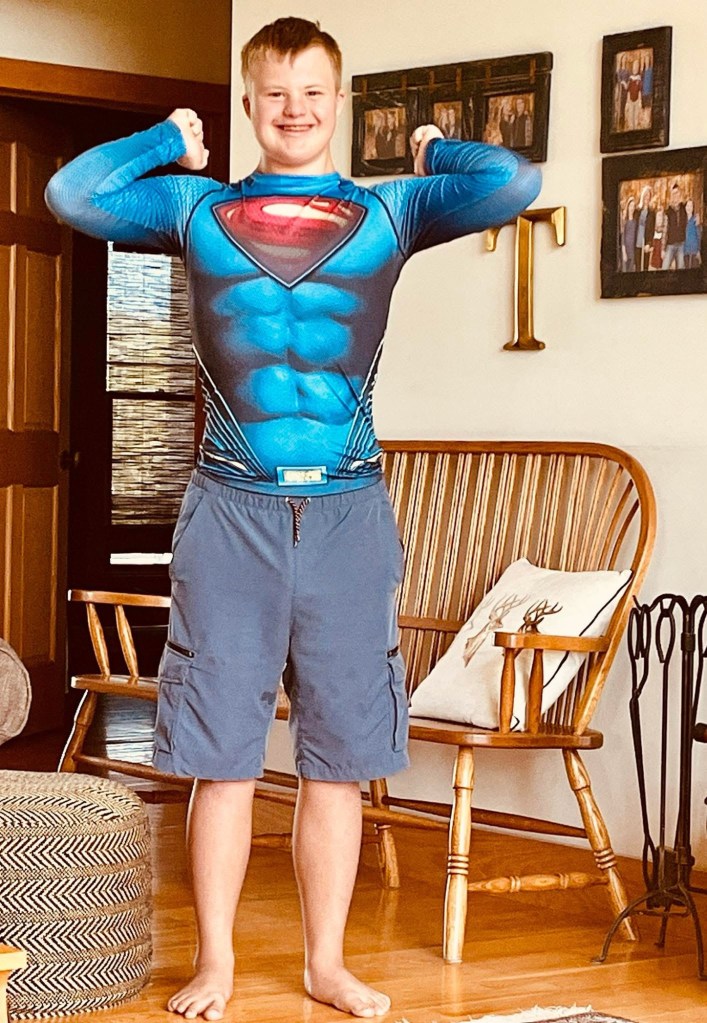Click Here: Stories of Wil: Puberty Part 1 on Amazon.com
I have recently gotten back in the pool (after a year 😅) thanks to our friend, Dawn, taking great care of Wil after school and honing in on his life skills learning.
While I swam Monday, Dawn’s husband came over to have a guitar jam session with Wil 🎸
When you have a dependent child, your schedule revolves around that child’s schedule. It takes a lot to find someone you fully trust, and that matches your schedule, so you and your child both can enjoy needed independence time.
Wil is my buddy, and he is so much fun! I’m thankful he’s not flying from this nest for some time to come. And yet, Wil is almost 19. He deserves someone other than mom all the time to expand his young adult life.
When I mention respite care outside of our disability circle, I receive a blank stare in response. That likely wouldn’t have been in my vocabulary either! But independence doesn’t happen without it when you have a dependent child.
When you meet someone with a dependent child, know that they most likely love having their child home, but at the same time, both parent and child need time to spread their wings, and that doesn’t happen without an extra set of loving, caring hands.
Our lives always include extras, and that extra includes extra special people with extra special hearts. 💕

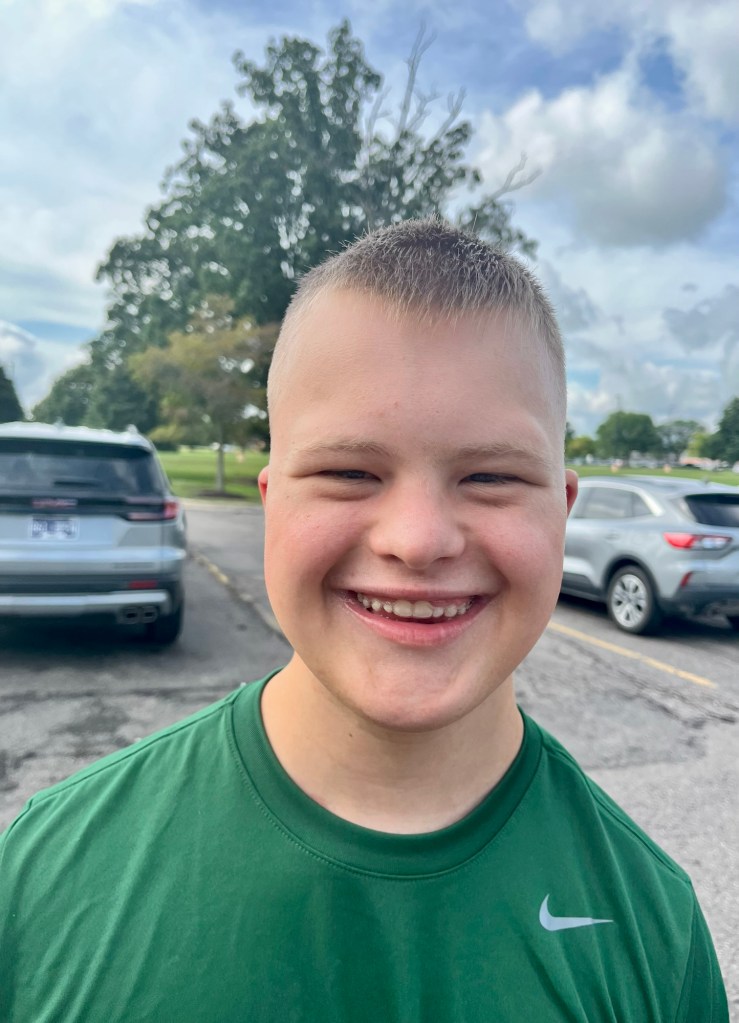
Watching Wil get his haircut today had me nearly in tears. The clippers buzzing, Wil chatting, smiling, relaxed.
Years ago this sight was a distant dream. The haircut triggered my emotions, but deep down it’s about progress.
It’s about feeling so desperate and on-guard with almost anything you do, because so much is a struggle for your child to acclimate to.
It’s about walking out the door, but never just walking out the door.
It’s about always thinking ahead, strategizing what might trigger your child. And even as much as you think ahead random things happen. A dog barks and dang, its the one time you forgot the noise-cancelling headphones, and your child takes off and you sprint after them before they hit the parking lot on the way to the car. Leaving the house is never just leaving the house. You always have to leave with as much of a crystal ball as you can muster.
And then fast-forward to watching your grown child calmly sit, and you actually left the house without much of a plan.
I think, a lot of times, happiness is not some elusive place, but a place of working hard for something. Of just climbing that ladder every day, and you are so used to climbing it, that you don’t even realize you’ve hit this certain level until one ordinary day you are blissfully suspended in air.
And once your brain’s thought process catches up to that elevated feeling and brings you back to earth, you realize happiness is about progress.
Growing up, Wil has loved boat rides with his Grandma and Grandpa. So when his sisters were invited on an impromptu trip around the lake with some of the neighbor’s kids, they jumped on — and Wil stayed back with his grandparents.
My dad noticed a shift in Wil’s demeanor. He didn’t say anything, but my dad could feel it — that quiet pause, the internal processing. He turned to my mom and said, “Wil wanted to go too.” They decided they’d take Wil out for his own boat ride to lift his spirits. So off they went, stopping at his favorite swim spots along the way. Wil jumped in the water as he always does, with my parents jumping in with him. It worked — his mood lifted (there’s good reason Wil adores his grandparents!).
But the moment they returned to the dock, Wil spotted his sisters and the neighbors hanging out in the yard. My mom said he couldn’t get off the boat fast enough to join them.
Whenever Wil turns a corner in maturity, I feel a sudden wave of sadness for him — and then, not long after, I’m chuckling at his light-hearted ingenuity.
This summer in speech, Wil is working on initiating conversations. He struggles with finding ways to insert himself — to say things like, “Hey! I want to go too!” It seems so simple, but that’s just not in his current arsenal. He wanted to go, but didn’t know how to insert himself. But eventually, he found his way.
Processing time may be slower for Wil, but that does not mean his ways are not effective.
I share this story because no one intentionally left Wil out. In the past, he’s always chosen boat rides with his grandparents — that’s been his comfort zone. If he had said he wanted to go, he would’ve been welcomed. So sometimes, inclusion isn’t about purposeful exclusion. It’s about learning how to speak up — and that’s exactly what Wil is learning to do now.
I’m curious now to see if Wil does start to speak up more. He’s entering a new season — he’s graduated high school, and he’ll be around new people who don’t know him as well. They won’t read his cues the way longtime friends have. That shift will come with challenges, but maybe also with opportunities.
Because often, inclusion really just begins with getting to know someone. And showing up — or speaking up — in a way that you can be known.
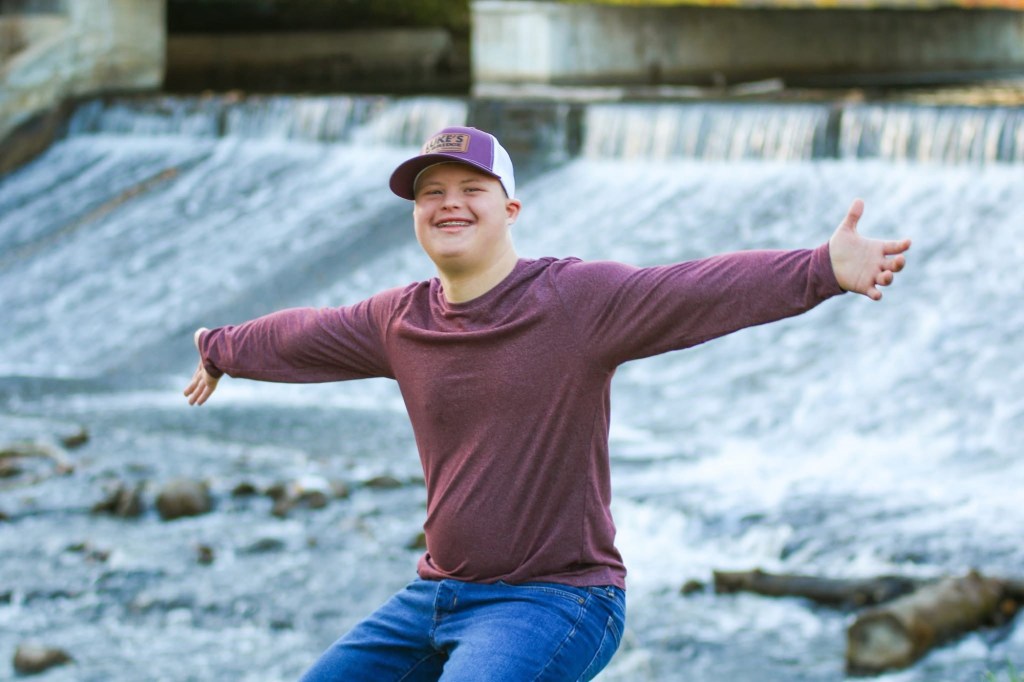
I remember one day wearing a “Down Right Perfect” t-shirt as I marched up to the high school doors to collect Wil after school hours because he had run from getting on the bus. He booked it up the steps to the second floor and hid. Once he was found, Mr. Walsh walked him down to the media center, and waited with him until my arrival. In that moment, I felt the irony of what I was advertising on my t-shirt.
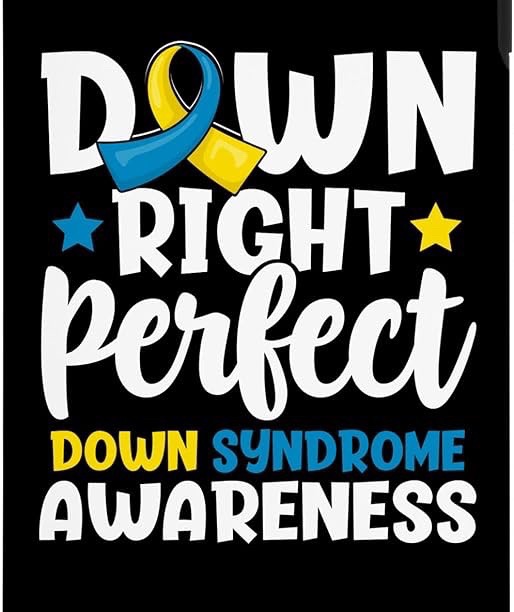
We parents of children with Down syndrome also get a “Down Right Perfect” label, too. Like our kids, the label doesn’t always stick. If we are specifically chosen to raise our children with Down syndrome, I believe it’s because we have extra learning to do that goes hand-in-hand with extra chromosomes. I’ve certainly learned extra patience with Wil, but there are many times my patience misses the bus and books it up the steps until I go up to determinedly collect it.
At noon today, Wil sat on the floor in his pajama top and underwear. Speech therapy was in 30 minutes, and it’s a 20-minute drive. Wil and I had been going round and round. I’d gotten him from the basement to his bedroom, giving him the patience and space he needed. But once he got up to the bedroom, he came to a full stop.
I was quickly draining patience. His refusals used to be a regular occurrence. Depending on the occasion, I’d prep him an hour to 30 minutes before the event. But now he rarely declined doing something he enjoyed. He also knows his daily schedule – when he got up this morning, he cheerfully said, “Summer speech today!”
“Yep, at 12:30, just after lunch,” I replied, just as cheerful, woefully unprepared for the stop sign up ahead that would materialize out of nowhere.
I didn’t know what turned the tide for him. I didn’t know what turned the tide for me either. Whatever flipped his switch set off a detonator on mine, too. I called Matt to talk to Wil because I knew I wasn’t in a mental space to. I put Matt on speaker. Wil responded to Matt’s call and started to get dressed. I took a deep breath. But as soon as I hung up the phone, Wil stopped all forward motion. I called Matt again. Now I knew I was getting on his nerves, too. None of this was going in any forward type of direction.
I left Wil’s bedroom to give us both space. I texted the speech therapist that Wil was stuck and likely late. She is no stranger to Wil or to what “stuck” for our kids means.
“No line dancing tomorrow, Wil!” I heard Wil say to himself. He recently started personal training with Brandi, and she knows his country vibe. She’s a Southern girl; the two of them are a great match. She promised a line dance at their session tomorrow. Wil was grounding himself from something he wanted to do because he wasn’t getting dressed. I walked back into his bedroom.
“Wil,” I said, “I don’t know what is going on. You love speech therapy. You love Miss Kim. I set all these activities up for you, and I ask you first. I don’t make you do anything you don’t want to do. You are 18 years old and you need to honor your commitments.” I don’t know what else I said, but I went on in that vein, and there is no way he could have processed it all. To him, I was like one of the adults from the Peanuts cartoons, “Wah wah wah wah wah.” Then I realized I had also butt-dialed Matt. WAH!!!
Wil did eventually get dressed, and Katherine drove him to speech therapy. I asked her to take her time, not rush; they knew he was going to be late (Thanks, Katherine!). Kim, the speech therapist, was very kind and understanding. She even sent me a text message after their session saying he did great (Thanks, Kim!). That Mr. Rogers was always Down Right Perfect in his advice: “Look for the helpers. You will always find people who are helping.”
I thought over all the things I coulda, woulda, shoulda done. I think I’m just overwhelmed with all the things I’m coordinating for him right now. When Wil did the PEAC bike camp a few years ago, the founder of the program said to me, “Activities for our kids don’t just happen. You have to create them.”
Raising a child with a disability, at least for me, is this mix of intense proactive coordination and gratitude for what is. There is so much to get ahead of, to be proactive with, and to premeditate. On the flip side, I’m incredibly grateful for what is available, for the people who care, for the people who make mountains move, for the helpers and understanders.
I think it really was as simple as me feeling all the stops and starts and desiring a flow, while at the same time Wil needed to put a plug in things. We were playing a game of red light, green light from opposite directions.
When Wil got home he was hungry.
“What do you want?” I asked.
“Nachos.”
“Ok, let’s get out all the fixings.”
As we assembled the nachos, I asked him why he got stuck earlier.
“The rain.”
“Oh, the rain. Thanks for telling me. Now I know for next time.”
“Yep! Mom, these look good.”
“Down Right Perfect, Wil!”
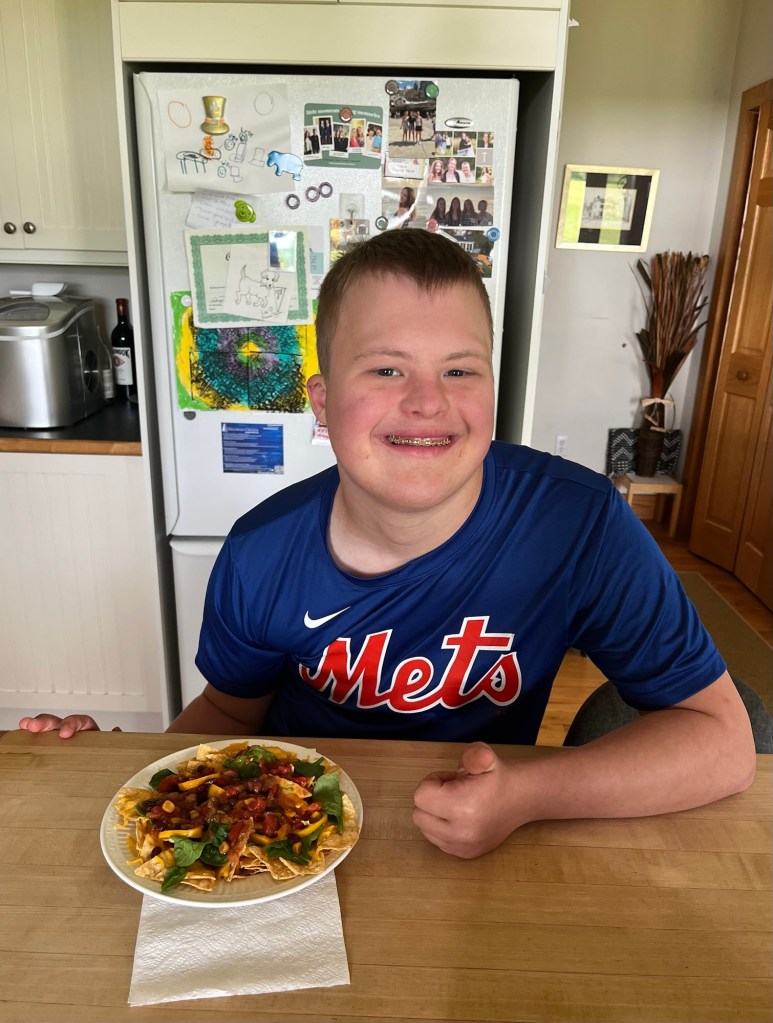
A singular new word Wil calmly adds to his vocabulary, in a such a way that only I — or his closest educators — would hear stands out like a stacatto flashing me back in time to a movie reel loop when he was 5 or 7 or 10, working a skill on a repeat loop that at the time I couldn’t see beyond.
But here I stand, still marveling at one added word, one added achievement, one added milestone, taking me back and pushing us forward seemingly in flow but full of staccato moments.
I’m not who I used to be raising Wil, yet I’m closer to who I am at my core.
I must pave ways for Wil and yet must leave space for him to create his own. He has a high level of vulnerability and yet has an inner strength many desire.
Wil has grown in me a patience I never knew I had, and yet also has grown an immense impatience to grow more; to learn more; to expand borders.
I have learned many stereotypes are hysterically true; and many are heretically innaccurate. Wil’s sisters called him, “Wil ‘the snail’ Taylor” every time they followed him as he two-stepped up and down the stairs. I’ve shared many laughs with fellow Ds mommas over stereotypes and shared many tears with these same mothers over stereotypes. Stereotypes can bind or separate. You need to walk the walk to know which is what.
And friendships. He has some deep ones. He also has many cheerleaders we’ll never see again once he leaves this school. But the impact his presence has made, and theirs on him, is undeniable.
Raising Wil is a paradox; surface friendships that leave a lasting impact, single breakthrough words that flash back to a former time loop on repeat, patience that creates a relentless drive, stereotypes that create binding laughs in their known truths, and stereotypes that create pain in their ignorance of the truth.
I now stand beside Wil with great hope of what’s ahead, pure enjoyment of where we stand right now, bouyed by the memories that brought us here, and on occasion flash me back.
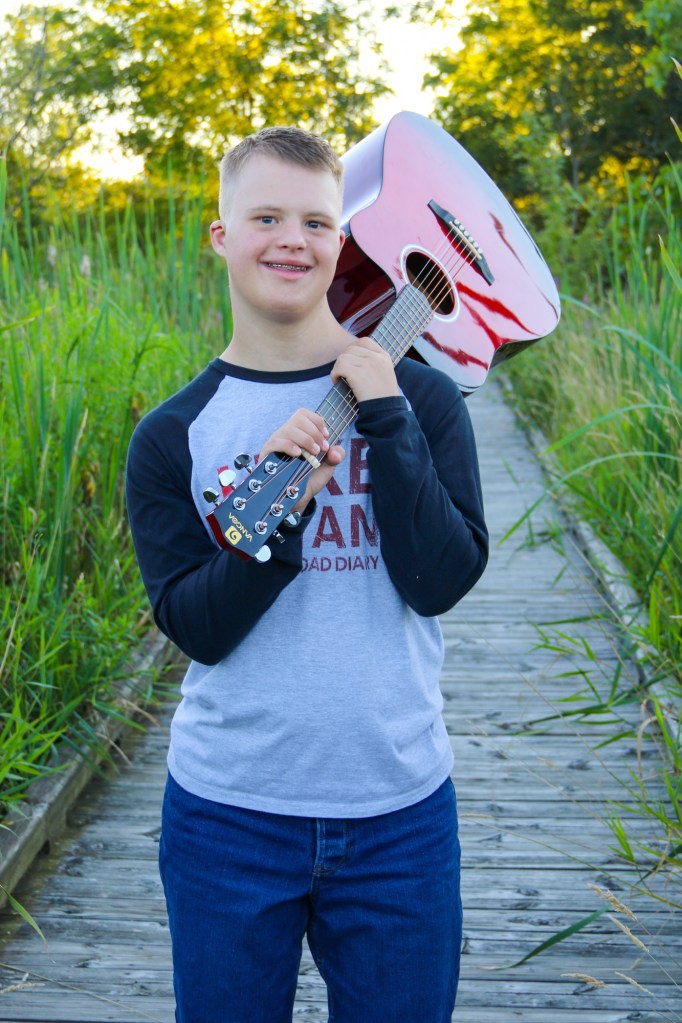
Wil is graduating; this is a hard one. Raising Wil I’ve gone through what I think of as “3 acceptances” so far:
Wil is ready to graduate, though; he’s ready for this next step. But for me, there is so much. So, so much. All that I personally have navigated through his birth and school years. The scenery is different raising a child with a disability. It has to be because disability forces us to see life in a different way.
There are two boys, Eli & Ethan who have higher levels of autism. I love watching their reels. They are quirky and fun and frustrating. When you see them for who they are, you can’t help but fall in love and feel the shift of scenery as you tune into their lives.
I can feel Eli & Ethan’s mother’s joy when one new word emerges. I understand all of her pauses, giving her boys the time and space to speak.
Our world with disabilities is warp speed and turtle-slow processing all wrapped into one.
I’m standing here spinning, on the edge of this next level. It’s dizzying but all the same I’m thankful for the eyes to view the world from this place. ❤️

Wil has a very set — and happy — routine in the morning.
His alarm goes off, I go to his room, sing him a song and give him a hug (definitely a daily stop and smell the roses moment for me — making time for songs and hugs are Wil’s priorities and remind me of mine).
Wil gets dressed then always makes an appearance as he walks into the living room opening his arms wide showing off his outfit. “Mom look!”
He then watches Wild Kratt’s on PBS Kids while he eats breakfast. Next on is Alma’s Way. At the start of Alma’s Way is the theme song (which he of course sings). The song ends with an enthusiastic “Wepa!”
After the theme song he knows it’s time to put is plate in the diswasher, brush his teeth, get on his Crocs, and pick out his hat (he wears a baseball hat every day). It’s a fun and timely schedule that works for us.
Except one morning…
There was a Wild Kratt’s movie instead of the regular 30 min show 😲 I was in the bathroom getting makeup on waiting to hear Wil’s “Wepa!” It didn’t come.
I went to the living room to see what was up. Wil was happily chilling, breakfast eaten, clearly not realizing the time.
If you read my blogs when Wil was younger, morning routines were HARD. Any little thing could throw him off. We’ve come so far from that time; so very far. Because of those early experiences, our mornings are always very carefully crafted.
I took a deep breath, and explained it was a movie. “Sorry Bud. I know this is not what you are used to. We can still sing Alma’s Way while we brush your teeth.”
He grunted and let me know he was not moving.
“Hey, I get it. But school is starting on time whether you are there or not. They’ll sure miss you.” I walked away to leave him to processing it. If he has a high motivator on the other side of his upset, he usually comes out of it if I give him space.
Sure enough, he started self-talking. I eavesdropped from my bedroom. In minutes he popped up and started singing.
“Wepa!” 🙌❤️
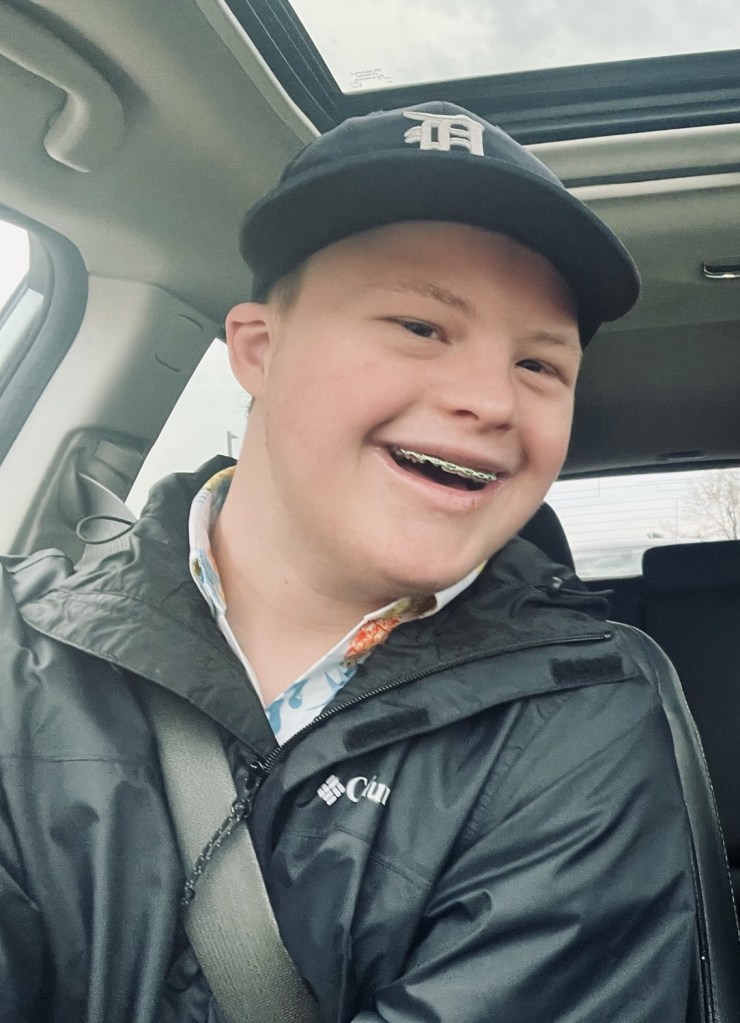

I think all of us look at our seniors in wonder.
Because when they are born, that’s all we can do; we can never quite know how the future will unfold.
I still wonder as I look back on how he — and we all — got here.
I cannot fully express my gratitude for the village that surrounds my son. And when I thank those in our village, the reply is in unamimous gratitude for what Wil gives to the village.
It’s as it should be, and yet it’s a beautiful wonder.
May we all keep sharing our wonder ❤️
Our Human Services leader is telling us to be weak. To be devasted by a diagnosis. To feel damaged because our children are neurodiverse and may not pay taxes.
I was devastated but I CHOSE to RISE! I CHOSE to love my child for who they were and to find others that gave me strength when I couldn’t yet find it in myself.
Now I am a warrior.
I love my child and have a new appreciation for differences that I would not otherwise have if I were justified by “leaders” in my devastation. In fact, thats how so many with disabilities were housed in institutions. The photos from that time are unbearable to look at.
True strength is doing the INTERNAL WORK of understanding neurodivergence. Not pointing from the outside looking in and making judgements. And telling an entire country to make that judgement.
Here is my advice AS A LEADER BECAUSE I LIVE IT. Feel the devastation if that’s real for you, then choose to walk in it and feel the exhilarating growth of what seeing life from a new perspective feels like. That’s being a warrior, my friend. That’s being a true contributor, a true leader, to society.
Or choose to point to what you see as devastation and lack, and watch the lack and devastation grow because that’s what you choose to believe in.
I know what I have chosen. I chose to do the work of understanding neurodiversity, and I still am. It’s a path worth eternally growing in every.single.day.
Don’t let this so called leader set the clock back on our kids. Listen to the true leaders. Those of us who walk the walk and would never, ever call it devastation. Though many of us did once feel that devastation, we didn’t stand there long.
It’s a journey that first chose us, and now we undoubtedly and assuredly choose this Journey.

This morning I lifted arms, and was in between weight choices — one was a little too heavy and one a little too light.
I chose the lighter weight today. I really focused on contracting my muscle and slowing down. Veins and muscles popped with the lighter weight as I was super focused on form.
Raising a child with a disability is like that — heck most of life is. We can force and push and there’s a time for that. But we can also lose sight of the details behind why we are pushing. Is the goal to push, or is the goal to build details? Sometimes it’s one, and sometimes it’s the other.
But what’s key is to slow down and ask ourselves why we are doing something. Throwing our weight around, forcing an outcome, is not always the answer. Choosing details over force is not always being passive.
In the end, it’s about what we want out of it and what we put into it.
Sometimes its alot of slow, intentional reps over and over and over. Working hard, but under the radar, with full intention on that choice.
It’s how we carry out the intention behind our choice to the best of our ability.
With Wil, it’s mostly been light weights — details over and over and over. A lot of intentional reps that may look insignificant externally, but one day those muscles just pop and speak for themselves. 😃🙌💪🦸♂️
